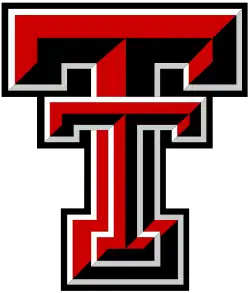National Ranching Heritage Center
The National Ranching Heritage Center, a museum of ranching history, is located on the campus of Texas Tech University in Lubbock, Texas. The NRHC features almost fifty authentic ranch buildings dating from the late 18th to the mid-20th century. These structures include a railroad depot, homesteads, barn, blacksmith shop, schoolhouse, windmills and other historic structures. One views the exhibits through a self-guided walking tour. It is free to the public.


History
The center was established in 1969 by the Ranching Heritage Association.[1] Its first director was the historian and archaeologist William Curry Holden From 1977 to 1980, Jim Humphreys, who managed the Pitchfork Ranch in Dickens and King counties from 1965 to 1986, was the board chairman. Until 1999, the NRHC was a part of the Museum of Texas Tech University, to which it is adjacently located.
The NRHC has received donations from Montie Ritchie, the manager of the JA Ranch southeast of Amarillo from 1935 until his retirement in 1993.[2]
In 2013, David M. "Matt" Brockman was named NRHC executive director. Formerly, he has been the administrative manager of the Southwestern Exposition and Livestock Show, commonly known as the Fort Worth Stock Show and Rodeo.[3]
Also in 2013, Miguel Martinez, a 14-year-old from Lubbock, was impaled through the chest by the horn of a bull statue while playing hide-and-seek at night in front of the National Ranching Heritage Center.[4]
The home of the wealthy African-American rancher, Daniel Webster Wallace, known as "80 John" Wallace, was built ca. 1900 in Loraine in Mitchell County. It is now open at the NRHC.[5]
On January 22, 2019, the Heritage Center launched an exhibit which shows the importance of the different breeds of cattle brought into the southwestern United States. The first cattle, explains the exhibit, were Andalusian brought to the continent in the second voyage of Christopher Columbus. Later breeds, such as Hereford, Angus, and the Texas Longhorn shaped the destiny of the American West.[6]
Gallery
 The Barton House, an example of Queen Anne style architecture, was relocated to the Heritage Center from Hale County. It is named for Joseph J. Barton.
The Barton House, an example of Queen Anne style architecture, was relocated to the Heritage Center from Hale County. It is named for Joseph J. Barton. U Lazy S Carriage House, owned by John B. Slaughter, was moved from Post to the NRHC.
U Lazy S Carriage House, owned by John B. Slaughter, was moved from Post to the NRHC. Hedwig's Hill Dogtrot House (1855) is essentially two log cabins under a common roof relocated from Mason County
Hedwig's Hill Dogtrot House (1855) is essentially two log cabins under a common roof relocated from Mason County Restored Texan pioneer house
Restored Texan pioneer house The 6666 barn stood near the home of rancher Samuel Burk Burnett in Guthrie until it was removed to the NRHC.
The 6666 barn stood near the home of rancher Samuel Burk Burnett in Guthrie until it was removed to the NRHC. The Jowell House (1872-1873) from Palo Pinto County is a fortress style residence, with an outside ladder to the second floor.
The Jowell House (1872-1873) from Palo Pinto County is a fortress style residence, with an outside ladder to the second floor. Because children frequently died young in the American West, the heritage center relocated this Jowell Cemetery (1876-1889) from Palo Pinto County.
Because children frequently died young in the American West, the heritage center relocated this Jowell Cemetery (1876-1889) from Palo Pinto County. Atchison, Topeka and Santa Fe Railroad at the Ropes Depot
Atchison, Topeka and Santa Fe Railroad at the Ropes Depot This half-dugout (1888) in Dickens County was removed from the Matador Ranch to the NRHC.
This half-dugout (1888) in Dickens County was removed from the Matador Ranch to the NRHC. Waggoner Ranch commissary (1870s), relocated to the NRHC from Wichita County
Waggoner Ranch commissary (1870s), relocated to the NRHC from Wichita County
 Box and strip house (1903, 1907), with dual entrances but uninsulated, was relocated to the NRHC from Martin County.
Box and strip house (1903, 1907), with dual entrances but uninsulated, was relocated to the NRHC from Martin County. Pioneer mail station (1875) relocated from Knox County
Pioneer mail station (1875) relocated from Knox County Starmill windmill at NRHC
Starmill windmill at NRHC A cart for transporting water from a well powered by a windmill
A cart for transporting water from a well powered by a windmill The Harrell House, named for sisters Fay and Myrtle Harrell of Scurry County, was built in phases between 1885 and 1917.
The Harrell House, named for sisters Fay and Myrtle Harrell of Scurry County, was built in phases between 1885 and 1917. Pioneer kitchen in Harrell House
Pioneer kitchen in Harrell House Dining room at Harrell House
Dining room at Harrell House Restored Pitchfork Ranch cookhouse from Dickens County at NRHC
Restored Pitchfork Ranch cookhouse from Dickens County at NRHC A ranch office building at the Heritage Center
A ranch office building at the Heritage Center Inside of ranch office
Inside of ranch office The Los Corralitos (meaning "Little Corrals") Building was relocated to the Heritage Center from Zapata County in South Texas
The Los Corralitos (meaning "Little Corrals") Building was relocated to the Heritage Center from Zapata County in South Texas Replica of Tooter Cannon Saddle Shop at Heritage Center
Replica of Tooter Cannon Saddle Shop at Heritage Center Quanah Parker exhibit
Quanah Parker exhibit Ranching Center hours
Ranching Center hours
See also
References
- "Ranching Heritage Center is unique". The Galveston Daily News. Galveston, Texas. September 9, 1983. p. 6. Retrieved January 3, 2016 – via Newspapers.com.

- Montie Ritchie
- Texas Tech University press release, June 14, 2013
- https://www.cbsnews.com/news/miguel-martinez-14-dies-after-apparent-bizarre-accident-on-texas-tech-campus/
- http://www.depts.ttu.edu/ranchhc/HistoricalPark.htm
- Ray Westbrook (January 21, 2019). "A-J remembers: Lubbock's Ranching Heritage Center is rounding up cattle industry". Lubbock Avalanche-Journal. Retrieved January 25, 2019.
| Wikimedia Commons has media related to National Ranching Heritage Center. |
